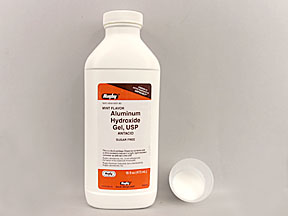
Aluminum Hydroxide Gel Coupons & Savings Card – Discount Prices from $6.80
This medication is designed to alleviate symptoms caused by excess stomach acid, including stomach upset, heartburn, and acid indigestion. Aluminum hydroxide acts as an antacid that rapidly reduces stomach acid levels. Liquid forms of antacids generally provide quicker relief compared to tablets or capsules. It is important to note that this medication only neutralizes existing stomach acid and does not inhibit new acid production. It can be used on its own or in conjunction with other acid-reducing medications, such as H2 blockers (like cimetidine or ranitidine) and proton pump inhibitors (such as omeprazole).
Our coupons are free to use. Before paying, show the pharmacist your Aluminum Hydroxide Gel savings card to get your free discount. Use our filters below to edit the prescription box to match your needs. The Aluminum Hydroxide Gel prices will update based on your prescription needs. Above our Aluminum Hydroxide Gel coupons, you can change your location to see pharmacy prices and costs in other areas. We're here to help you buy Aluminum Hydroxide Gel at the lowest price with our prescription discount card.
My prescription
Edit
473ML of 320MG/5ML, Aluminum Hydroxide Gel (1 Bottle)
Select pharmacy

Albertsons
$6.80
COUPON PRICE
Walgreens
$6.80
COUPON PRICEAluminum Hydroxide Gel savings card
Show this card to your pharmacist
Albertsons
$6.80
BIN
ID
PCN
GRP
011867
LH0E98FE64
HT
LABH001
Powered by
This medication is designed to alleviate symptoms caused by excess stomach acid, including stomach upset, heartburn, and acid indigestion. Aluminum hydroxide acts as an antacid that rapidly reduces stomach acid levels. Liquid forms of antacids generally provide quicker relief compared to tablets or capsules. It is important to note that this medication only neutralizes existing stomach acid and does not inhibit new acid production. It can be used on its own or in conjunction with other acid-reducing medications, such as H2 blockers (like cimetidine or ranitidine) and proton pump inhibitors (such as omeprazole).
Our coupons are free to use. Before paying, show the pharmacist your Aluminum Hydroxide Gel savings card to get your free discount. Use our filters below to edit the prescription box to match your needs. The Aluminum Hydroxide Gel prices will update based on your prescription needs. Above our Aluminum Hydroxide Gel coupons, you can change your location to see pharmacy prices and costs in other areas. We're here to help you buy Aluminum Hydroxide Gel at the lowest price with our prescription discount card.
Aluminum Hydroxide Gel dosage forms
Use our Aluminum Hydroxide Gel 30ML of 320MG/5ML coupon with prices from $2.43 for 1 Cup. You can also use our Aluminum Hydroxide Gel 30ML of 320MG/5ML coupon with prices from $2.86 for 2 Cups. We have a Aluminum Hydroxide Gel 30ML of 320MG/5ML coupon with prices from $3.29 for 3 Cups.
Dosage Quantity Price from Per unit 30ML of 320MG/5ML 1 Cup $2.43 $2.43 30ML of 320MG/5ML 2 Cups $2.86 $1.43 30ML of 320MG/5ML 3 Cups $3.29 $1.10
| Dosage | Quantity | Price from | Per unit |
|---|---|---|---|
| 30ML of 320MG/5ML | 1 Cup | $2.43 | $2.43 |
| 30ML of 320MG/5ML | 2 Cups | $2.86 | $1.43 |
| 30ML of 320MG/5ML | 3 Cups | $3.29 | $1.10 |
